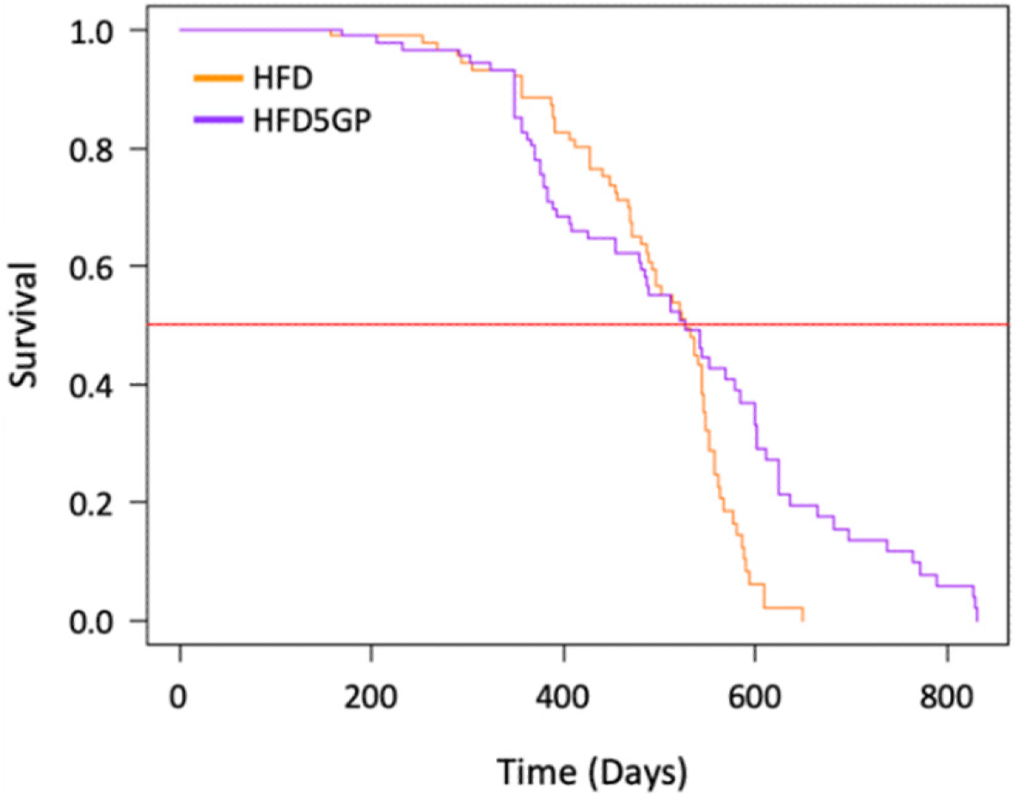Eating Grapes Could Counter the Life-Shortening Effects of Junk Food, Suggests Study
Mice on a Western-style diet live significantly longer lives, have less liver fat, and display increased antioxidant gene activation when supplemented with grape powder.
Highlights:
- Mice on a Western-style diet can live approximately 27% longer when fed freeze-dried grape powder.
- Grape supplementation decreases fat droplets in the liver, suggesting protection against non-alcoholic fatty liver disease.
- Antioxidant gene activation increases in response to grape supplementation.
The so-called Western-style diet, consisting of high levels of refined carbohydrates and saturated fats, has consistently been associated with diseases that lead to mortality late in life, such as heart disease — the top-ranking cause of death. Still, perhaps due to socioeconomic and cultural factors, many individuals partake in such a diet throughout their lifespan. For this reason, scientists continue to search for ways to counter the aging effects of the Western-style diet.
Researchers from Western New England University and Long Island University report in Foods data suggesting eating less than 2 cups of grapes a day may mitigate aging. Dave and colleagues show that if mice consume a Western-style-like diet along with grape powder, the mice live longer. Additionally, the grape powder reduces fat droplets in the liver, suggesting that grapes could protect against non-alcoholic fatty liver disease. Furthermore, grape powder increases antioxidant gene activity, likely underlying the beneficial effects of grapes.
Grape Powder Prolongs Lifespan, Reduces Liver Fat, and Increases Antioxidant Genes
To model a Western-style diet, scientists commonly feed mice a high-fat diet (HFD). Dave and colleagues fed 200 female mice a HFD consisting of 42% fat from milk, which is mostly saturated fat. To test the effect of grapes, half of the HFD mice were supplemented with freeze-dried grape powder, consisting of seedless red, green, and black grapes. The grape powder was used as a surrogate for fresh grapes.
The mice began the HFD at 14 weeks of age, a little over 20 years old in human years, as approximated from this converter. The researchers generated a survival curve by tallying the age at which each mouse died. Of the HFD mice treated with grape powder, several lived to be over 2 years old, equivalent to about 70 human years. On the other hand, only a few untreated HFD mice lived over 1.6 years old, closer to about 60 human years.

A major problem with the Western-style diet is that it often leads to obesity and metabolic diseases like type 2 diabetes. The Western-style diet is also associated with non-alcoholic fatty liver disease. For this reason, Dave and colleagues measured fat droplets from the livers of HFD mice. They found that HFD mice supplemented with grape powder had significantly fewer fat droplets than untreated HFD mice, suggesting that grapes could protect against metabolic diseases like non-alcoholic fatty liver disease.

Grapes contain antioxidants like resveratrol, which have anti-aging effects. Dave and colleagues wanted to test the effects of whole grapes, which may contain multiple antioxidant molecules, as well as other anti-aging molecules. This is why they used grape powder, a surrogate for whole grapes.
By analyzing gene activity, the researchers found that antioxidant genes were increased in the livers of mice supplemented with grape powder, even when not on a standard diet. This means that yet-to-be-identified molecules within grapes could alter the gene activation of patterns of liver cells to increase antioxidant gene activity. This antioxidant gene activity could be responsible for the observed anti-aging effects of grapes.
Can Eating a Bunch of Grapes Counter Aging?
It was estimated that the 5% grape powder fed to the mice in this study corresponds to about 300 grams of fresh grapes for a human weighing 70 kg or around 150 pounds. This is about 2.5-fold more than a recommended ¾ cup serving of grapes. This means that most individuals who consistently eat a Western-style diet would need to eat nearly 2 cups of grapes each day for their entire life to potentially live longer and reduce the risk of fatty liver.
A clinical trial has tested the effect of 72 grams of grapes on older adults with mild cognitive impairment. The results showed that the grapes improve metabolic activity in the brain but do not improve cognitive outcomes. Based on these few studies, it would seem that eating a large number of grapes every day could counter aging in obese individuals but may have little effect on cognitive decline. Notably, these studies were funded by the California Grape Commission.
In general, a better method for countering aging if in the habit of eating a Western-style diet may be to eat less refined carbohydrates and saturated fats, especially in excess.
Model: Female C57BL/6J mice
Dosage: 5% grape powder, equivalent to about 300 grams, or 1.9 cups of grapes per day

